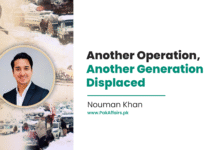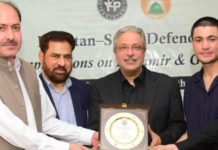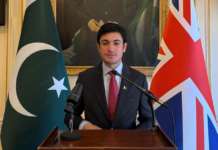The foundations of Pakistan-US relations were laid in 1954 when Pakistan in search of security against hegemonic India and Afghanistan claiming territories of Pakistan across the Durand Line opted to join SEATO and CENTO which were created by the US to contain the communist expansionism in South Asia and the Middle East. Although the western security pacts enabled Pakistan to boost its economic and military strength, the pacts proved worthless in the 1965 and 1971 wars with India since the US cut off military and economic assistance to Pakistan during the two crunch times.
After the Eisenhower era, the US began to entice India. The 1962 Sino-India border conflict gave President Kennedy a chance to win over India and doled out massive military assistance. Thereon, both the Republicans and the Democrats wooed India, but Nehru who was one of the top three non-aligned movement leaders showed little interest and remained content with deep-rooted economic and military ties with the USSR, which became India’s biggest supplier of arms.
Moreover, the Soviet veto helped India to ward off the UN pressure asking India to fulfill its promise of granting the right of self-determination to the Kashmiris and holding fair and free plebiscites. The great opportunity came the US way when the Soviet Union after losing the war in Afghanistan crumbled in 1991 and was reduced to Russian Federation. Without severing ties with Russia, India fell into the waiting lap of the US and became its strategic partner. Since then, while Pakistan fell from the grace of the US, Indo-US relations flourished leaps and bounds. Partnership with the US enabled India to boost its diplomatic, political, economic, military, and nuclear/missile strengths vastly due to which it is nurturing the hope of becoming a global power.
Pakistan-US relations on the other hand have hardly remained smooth and trouble-free. Apart from the element of mistrust which has clouded their relations, the main reason why the two couldn’t develop their relationship on the basis of mutual trust and respect was the overbearing attitude of the US. It has never treated Pakistan as a friend but dealt with it as a mercenary helping the US to achieve its objectives in the region and getting paid for the services rendered.
It was hired to contain communism, then to support the proxy war against the occupying Soviet forces in Afghanistan, and next to fight the Global War on Terror (GWOT). Successive regimes in Pakistan never objected to the US discriminatory behavior and its habit of giving dictations. The love of dollars was so great among the elites of Pakistan that they ignored the US injustices, arrogance, and its bullying outlook. The policymakers tailored foreign policy suiting the US interests and not the aspirations of the people of Pakistan who remained out of sync with the rulers.
The tone of the US leaders became harsh after 1990 and it slapped sanctions on Pakistan under the pretext of restraining it to build a nuclear bomb. Its tenor became harsher and threatening after 9/11. Although the US under George W. Bush took Gen Musharraf on board and declared Pakistan a coalition partner, it formed a strategic nexus with NATO, Israel, India, and the puppet regime in Kabul which marked Pakistan as one of the targets. To win the affections of the US, Pakistan not only helped the invaders to occupy Afghanistan but also provided two land routes for the transportation of logistics and arms for the ISAF.
Shamsi airbase was handed over to the CIA in 2003 to fire drones in FATA and the base remained functional till the end of 2011. Immigration at all the main airports and seaports was handled by the FBI. The CIA and FBI had complete freedom of action to operate in the country and the duo was instrumental in creating proxies in FATA and in Balochistan. Pakistan’s ambassador in Washington Hussain Haqqani and Interior Minister Rehman Malik inducted Blackwater, elements of the US Special Forces, security contractors, and the NGOs in large numbers in 2008-09. Glitter of dollars produced many snakes in the grass ready to sell their souls and national interests. Media outlets were purchased by foreign agencies to build perceptions of choice, sell false narratives, and promote obscenity and nudity. Under the garb of enlightened modernization to show the soft face of Pakistan to the West, secularism was promoted.
Throughout the 20-year GWOT in which Pakistan was made the frontline state to fight terrorism, Pakistan suffered more than any other country in fighting the war and its performance was much better than all the 48 countries participating in the war. The US diplomats and officials acknowledged Pakistan’s efforts in eradicating terrorism from its soil and also highlighted the critical role Pakistan could play in bringing peace to the region in general and Afghanistan in particular. However, their pats were combined with the use of sticks.
From 2006 onwards, the US started to sing the mantra of ‘Do More. More often, it expressed dissatisfaction and hurled insults and threats and accused Pakistan that it was either complicit with the Al Qaeda and the Taliban or was incompetent. Obama accelerated the drone war in FATA and also accused Pakistan of providing safe haven to the Haqqani Network (HN) in North Waziristan. Trump upped the ante by accusing Pakistan of deceit and lies and he cut off close support funds. He repeated the mantra of HN and declared Pakistan as a state sponsoring terrorism, but to the surprise of many, he offered to the visiting PM Imran Khan in 2019 his willingness to mediate to resolve the issue of Kashmir. But soon after the visit, India usurped Indian Occupied Kashmir (IOK).
The perverse ‘do more’ policy of the US which had a hidden design to bleed and exhaust Pak security forces was servilely obeyed by Pakistan till 2017. After Gen Bajwa refused to do more and asked the US to do more, Pakistan was put on the grey list of the FATF. Despite fulfilling 24 of the 27 demands and making good progress in the remaining three points, it has not been made white. FATF and the IMF are the new tools in use to force Pakistan to do more.
In its bid to keep the US appeased, the national interests and sovereignty were compromised. Pakistan didn’t object to the installation of the anti-Pakistan and pro-India regime in Kabul, the fast-expanding influence of archrival India in Afghanistan, the establishment of terror infrastructure by RAW-NDS in Afghanistan which unleashed the biggest ever covert war against Pakistan, and the initiation of the drone war.
Series of compromises made by Pakistani leaders and their willingness to dance to the tunes of Washington made the country soft, docile, and compliant. No Pakistani ruler picked up the courage to state that cross-border terrorism from Afghan soil which caused over 80,000 human and $130 billion financial losses was not possible without the connivance of the US and the ISAF. The financial assistance given by the US to Pakistan was mostly spent on fighting the proxies funded, trained, and equipped by RAW-NDS under the supervision of the CIA.
The US had apparently let loose the GWOT to eradicate terrorism and to make the world peaceful. Conversely, it has made it insecure and unsafe since the venture was launched with crooked intentions to neo-colonize the Muslim world and to steal its resources. All those who took part in the US-imposed war suffered, but Pakistan suffered the most. As a result of this war and the hybrid war launched by the adversaries, Pakistan’s society has got divided, politically polarized, and its economy has become fragile. Besides the huge internal and external challenges, it is faced with the monster of the Covid-19 pandemic which has further wilted the economy. There is no change in the wicked designs of India, hell-bent to undo Pakistan. It has already changed the special status of IOK and is now changing its demography.
The US co-opted Pakistan to ease its occupation of Afghanistan and to make it fight anti-American terrorist groups. It had also wanted to disable Pakistan’s nuclear program and to de-Islamise it and make it a compliant state of the US and India. CPEC was subsequently added to the list to scuttle it. The US now wants Pakistan to ensure the safe exit of the US-NATO troops, to revise the 2019 Doha peace agreement, and compel the Taliban to accept the US-made constitution and democracy and to share power with the AG regime.
The US has the brashness to expect all these favors from Pakistan even after repeatedly betraying it and unjustifiably punishing it for its uncommitted sins in the GWOT, and at the same time encouraging and rewarding the real sinners India and the Afghan regime for their cowardly clandestine acts to unravel Pakistan. What is most befuddling is that in spite of the history of betrayals and injustices, Pakistan leaders remain enchanted to the USA, and still consider duplicitous America to be a friend of Pakistan.
To keep it in good humor, the rulers went to the extent of brewing tensions in relations with time-tested and trustworthy China and slowing down the game-changing CPEC. They are now fracturing relations with the Taliban who are likely to return to power sooner than later. For the sake of Washington, all-out support is being extended to the wily and deceitful Ashraf Ghani (AG) regime which spares no opportunity to harm Pakistan. Soon after the visit of Gen Qamar Bajwa to Kabul, AG accused Pakistan of harboring the Taliban Shuras in Quetta, Miranshah, and Peshawar. He forgets that while he and the US have been bending over backward to win over the Taliban, his regime has been harboring and supporting anti-Pakistan TTP, Jamaat-e-Ahrar, Lashkar-e-Islam, and several other proscribed groups like BLA, BRA, BLF as well as ISIS Khorasan.
While Pakistan leaders myopically pinned hopes on each and every new president of the US that he will reset relations and restore the heydays of the 1950s and 1960s, the US interests and policies haven’t changed with the change of the president. Pakistan has never been in the good books of the US. No US administration has been a friend of Pakistan. Bush had called Musharraf his friend but he didn’t say the US was a friend of Pakistan. Likewise, the Pentagon has not been a friend of the Pak Army, but it cultivated relations with the army chiefs and a few selected generals.
No change for the good is expected from the Joe Biden administration as is being perceived by the optimists and the US lovers saying there will be a reset in relations. Biden has so far not given any indications to mend fraught relations and to wash out the element of mistrust, nor shown any warmth. He has not phoned Imran Khan (IK) and didn’t invite him to the Climate Change Summit on 22 April which was attended by 40 heads-of-states. John Kerry and Secretary Defence Lloyd Austin skipped Pakistan and visited other Asian countries. Washington seems to be irked over the release of Omar Saeed Sheikh and his three associates by the Supreme Court who were allegedly involved in the murder of American journalist Daniel Pearle in 2002.
Biden is more interested in pulling out 2500 American troops safe and sound from Afghanistan and at the same time retain the US influence with the help of the AG regime and Pakistan. To that end, he is also pursuing the old policy of ‘do more and is pressing Pakistan to play its part and compel the victorious Taliban to abandon their ambitions of re-introducing Islamic laws and establishing an Islamic Emirate. There is a perceived lack of sensitivity and gratitude on the part of the US for what Pakistan has and is doing to “pull the American chestnuts out of the fire on Afghanistan.”
IK is striving hard to establish warm and friendly relations with the Biden regime through socio-economic cooperation. He hopes to revive the abandoned scheme of George Bush of establishing Reconstruction of Opportunity Zones in former FATA and also wants to establish Pak-US Economic Zone at Karachi seaport to increase the volume of exports to the US markets. It is hoped that these steps are not meant to undermine China’s special economic zones planned along the CPEC route, and the Gwadar port!!
In order to earn the trust and confidence of the US and to become its strategic partner, sycophancy and timidity alone are not enough to impress the US leaders duly controlled by the Zionists and American Jews. What would impress them is if Pakistan agrees to provide military bases to the US, rollback its nuclear & missile programs, eliminate Islamic radicalism, stop espousing Islamic causes, and become a truly secular state, cease work on CPEC and get out of the tight embrace of China, remains cold towards Iran and Russia, recognize Israel, forget about Kashmir and accept the hegemony of India in the region.
Short of these steps, there is no hope of reviving the old glow and forging cordial relations with the USA. Since no leader in Pakistan can afford to make compromises on any, hence, Pak-US relations would remain lukewarm and self-centered. What Pakistan should worry is that it might be scapegoated if things go wrong in Afghanistan in the last phase and the fuming USA decides to give the parting kicks to Pakistan. The JS HQ and GHQ should prepare for such a contingency, and one way of warding off the possible threat is to deepen ties with China and Russia and to formulate a joint response action.




